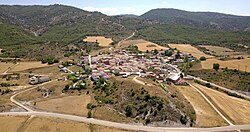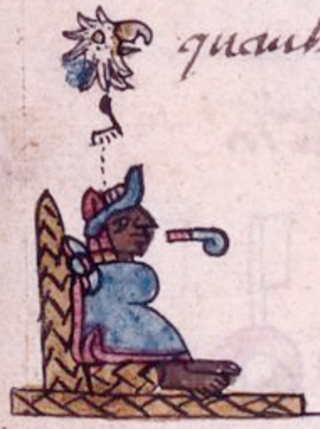
Cuauhtémoc, also known as Cuauhtemotzín, Guatimozín, or Guatémoc, was the Aztec ruler (tlatoani) of Tenochtitlan from 1520 to 1521, making him the last Aztec Emperor. The name Cuauhtemōc means "one who has descended like an eagle", and is commonly rendered in English as "Descending Eagle", as in the moment when an eagle folds its wings and plummets down to strike its prey. This is a name that implies aggressiveness and determination.
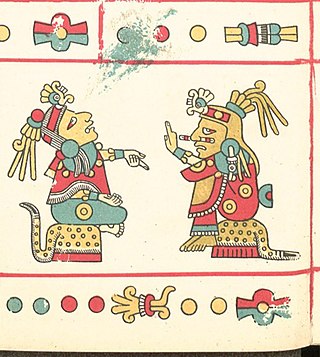
Ōmeteōtl is a name used to refer to the pair of Aztec deities Ometecuhtli and Omecihuatl, also known as Tōnacātēcuhtli and Tonacacihuatl. Ōme translates as "two" or "dual" in Nahuatl and teōtl translates as "god". The existence of such a concept and its significance is a matter of dispute among scholars of Mesoamerican religion. Ometeotl was one as the first divinity, and Ometecuhtli and Omecihuatl when the being became two to be able to reproduce all creation.
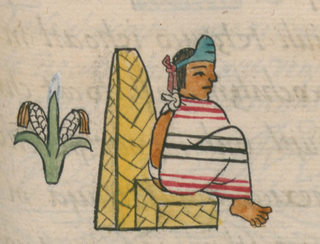
Cacamatzin (1483–1520) was the tlatoani (ruler) of Texcoco, the second most important city of the Aztec Empire.

Miguel León-Portilla was a Mexican anthropologist and historian, specializing in Aztec culture and literature of the pre-Columbian and colonial eras. Many of his works were translated to English and he was a well-recognized scholar internationally. In 2013, the Library of Congress of the United States bestowed on him the Living Legend Award.

Agurain in Basque or Salvatierra in Spanish is a town and municipality located in the province of Álava in the Basque Autonomous Community, northern Spain. The municipality, numbering 4,986 inhabitants (2015), is in turn the head town of the district or Cuadrilla of Salvatierra. The gross income per family amounts to 6,784 €. With reference to workforce by economic sectors, 10.36% are employed in agriculture, 35.78% in the industry sector, 47.92% in the service sector and 5.95% in the construction industry.
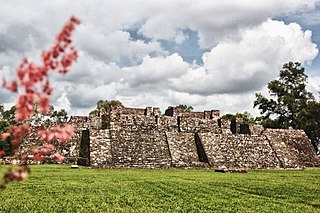
Aztec philosophy was a school of philosophy that developed out of Aztec culture. Aztec cosmology was in some sense dualistic, but exhibited a less common form of it known as dialectical monism. Aztec philosophy also included ethics and aesthetics. It has been asserted that the central question in Aztec philosophy was how people can find stability and balance in an ephemeral world.
Pablo de la Portilla was a soldier and pioneer in nineteenth-century California.

Miguel José de Azanza y Alegría, 1st Duke of Santa Fe, KOS was a Spanish politician and diplomat, and viceroy of New Spain from May 31, 1798 to April 30, 1800.
The Conspiracy of the Machetes was an unsuccessful rebellion against the Spanish in New Spain in 1799. Although the conspiracy posed no threat to Spanish rule, nevertheless it was a shock to the rulers. Coming only 11 years before the Grito de Dolores, it is considered in modern Mexico to be a precursor of the Mexican War of Independence.
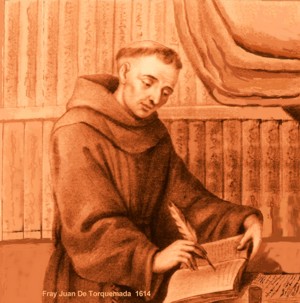
Juan de Torquemada was a Franciscan friar, active as missionary in colonial Mexico and considered the "leading Franciscan chronicler of his generation." Administrator, engineer, architect and ethnographer, he is most famous for his monumental work commonly known as Monarquía indiana, a survey of the history and culture of the indigenous peoples of New Spain together with an account of their conversion to Christianity, first published in Spain in 1615 and republished in 1723. Monarquia Indiana was the "prime text of Mexican history, and was destined to influence all subsequent chronicles until the twentieth century." It was used by later historians, the Franciscan Augustin de Vetancurt and most importantly by 18th-century Jesuit Francisco Javier Clavijero. No English translation of this work has ever been published.
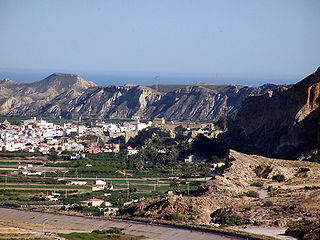
Cuevas del Almanzora is a municipality of Almería province, in the autonomous community of Andalusia, Spain.

Alonso de Molina was a Franciscan priest and grammarian, who wrote a well-known dictionary of the Nahuatl language published in 1571 and still used by scholars working on Nahuatl texts in the tradition of the New Philology. He also wrote a bilingual confessional manual for priests who served in Nahuatl-speaking communities.
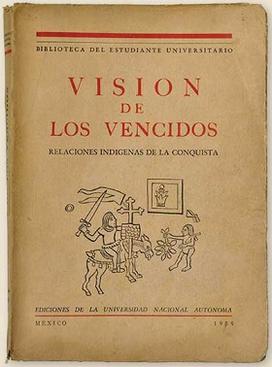
The Broken Spears: The Aztec Account of the Conquest of Mexico is a book by Mexican historian Miguel León-Portilla, translating selections of Nahuatl-language accounts of the Spanish conquest of the Aztec Empire. It was first published in Spanish in 1959, and in English in 1962. The most recent English edition was published in 2007 (ISBN 978-0807055007).
The Primeros Memoriales is an illustrated Nahuatl-language manuscript compiled by the Franciscan missionary Bernardino de Sahagún and his indigenous assistants in Tepepulco as the first part of his project to document pre-Columbian Nahua society, known as the Historia General de las Cosas de Nueva España.
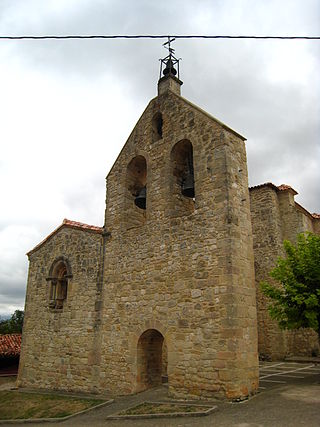
Bozoó is a municipality and town located in the province of Burgos, Castile and León, Spain. According to the 2004 census (INE), the municipality has a population of 110 inhabitants.
Cristian Portilla Rodríguez is a Spanish footballer who plays as an attacking midfielder.

The Cantares Mexicanos is a manuscript collection of Nahuatl songs or poems recorded in the 16th century. The 91 songs of the Cantares form the largest Nahuatl song collection, containing over half of all known traditional Nahuatl songs. It is currently located in the National Library of Mexico in Mexico City. A description is found in the census of prose manuscripts in the native tradition in the Handbook of Middle American Indians.
Álvaro Portilla Suárez is a Spanish footballer who plays for CD Móstoles URJC as a left midfielder.
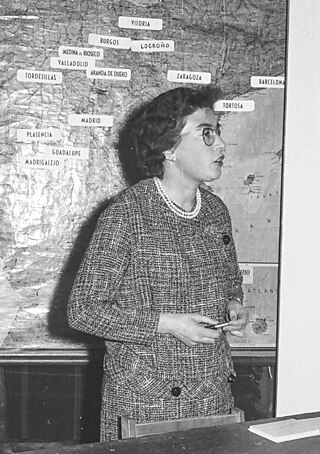
Micaela Portilla (1922–2005) was a Spanish anthropologist and historian. She was born in Vitoria, Basque Country in July 1922 and died there on 8 October 2005. She was an important Basque anthropologist and historian, having led many studies and other works in these fields through more sensitive and comprehensive methodological work. She created a school of followers in the province of Álava.
Portilla is a municipality located in the province of Cuenca, Castile-La Mancha, Spain
